Hello everyone and welcome to the first post on this new fun lil’ Substack of mine, Story Arc!
So first, an explainer. As many of you already know, I am a disgusting and grimy television addict and, if given the opportunity, will talk your ear off about whatever TV show I’m currently obsessed with. My friends in high school used to call it “Devoning” when I would bring up a show so much in conversation that they would boycott my favorite shows just to get a reaction out of me. Which, honestly, fair enough, I didn’t know how to shut my pie hole (and some might argue, still don’t). Over the years, I have Devon’ed many shows: Doctor Who, Buffy the Vampire Slayer, Lost, The Leftovers, Banshee, Mr. Robot, Evil, and let’s just say the list goes ON.
This project has been something I have been thinking over for a long time, as I have been looking for an outlet to put thoughts down about what I’m watching and reflect on how they’ve influenced my life and my own writing. Also there is the fact that I recently got laid off (-_-) as the industry I love seems like it’s been left for dead in a shallow grave, so I wanted to write about the things that keep me going when things are bleak. This #funemployment also means I have plenty of time on my hands to watch and think and write about TV (and maybe occasionally some other art forms), so here we are. I don’t know what this project will look like exactly as it continues, but I’m excited for this new medium and hope that at the very least it can be a jumping off piece for discussion about the art I love with my friends : )
Given that Pride Month has recently begun, I thought I’d kick off this Substack with a post about a show with some powerful queer messaging that I have not been able to get out of my head, X-Men ‘97.
The X-Men have always been… quite fruity, to say the least. I mean, just look at their spandex outfits! But the queer history of the characters run deeper then just their bright yellow unitards. Besides the obvious civil rights metaphor of “persecuted misfits being hated because they’re different that form a chosen family of weirdos,” there’s prominent queer X-Men such as Iceman, Morph, and Mystique who run the gambit (pun INTENDED) of the LGBTQIA+ spectrum. Marvel not-so-subtly used the Legacy Virus that debuted in 1993 as a metaphor for AIDS, as mutants were afflicted by a mysterious illness that the government stalled to act on until it became clear the illness could spread to humans (sound familiar?). And I still get chills from the scene reminiscent of gay conversion therapy camps in X-Men: The Last Stand where a young Angel bloodily pulls out his wings in an attempt to be “normal.” The X-Men are a lot like other pantheons in pop culture that queer people are drawn to like the Greek Gods and the cast of Buffy the Vampire Slayer. You’ve got a bunch of often-shirtless men and fabulously-dressed women serving cunt who are constantly kissing, fighting, and trying to save the world while attempting to manage their petty drama. Sounds like every queer friend group I’ve been a part of!
Before I get into this show, full disclosure: I was never an X-Men kid growing up, so I am not an expert in this subject. I used to read very dark and gritty comic books about Daredevil and Batman because I was a brooding little twink who thought that the coolest thing in the world was damaged men beating the shit out of other, slightly more damaged men. Or maybe I just had crushes on bad boys, who’s to say. My favorite work involving the X-Men was the masterpiece movie Logan (2017), though that was more of a neo-Western character study than a true X-Men ensemble piece (as I’m writing this, I’m realizing Wolverine is also a bad boy… will be unpacking with my therapist later). So I didn’t really have any expectation for X-Men ‘97 going in, but I was absolutely blown away by this show’s debut season. It’s probably one of the best Marvel projects I’ve ever seen, and takes the deep queer history of the X-Men and throws a moltov cocktail on the entire thing.
SPOILERS FOLLOW FOR THE FIRST SEASON OF X-MEN ‘97.
In the philosophical war of mutant-human relations, Professor X and Magneto espouse two distinct philosophies: Professor X believes humans and mutants can peacefully co-exist, while Magneto believes humans are aggressors and must be violently resisted. The two are sometimes compared to Martin Luther King and Malcolm X (legendary X-Men writer Chris Claremont has called the comparisons “valid” though has said he was primarily influenced by various political figures during his time growing up in Israel). But in many X-Men works, it’s the radical “Malcolm X” perspective that is othered, with the argument that violent means never justify good intentioned ends. In the name of mutant liberation, Magneto, the “Malcolm X” of the mutant world, is often a pretty clear-cut supervillain, doing shit like blowing up San Fransisco, inverting the Earth’s magnetic poles, and starting an organization literally called The Brotherhood of Evil Mutants. At the end of the day, it’s pretty clear that we’re supposed to side with the “good” mutant of Professor X who preaches tolerance, acceptance, and turning the other cheek.
When X-Men ‘97 opens, we’re in the feel-good Obama era of mutant-human relations. Cyclops and Jean Grey are thinking about retiring, mutants have the established safe island of Genosha that is being recognized as a sovereign nation by the United Nations, hell, even Magneto is trying to be peaceful, joining the X-Men as their leader after Professor X’s death and renouncing his violent ways of the past. Even though there are some bad actors causing trouble in the first few episodes, it seems like by and large, the broader world at large has gotten on board with the mutant brigade.
And then, in the jaw-dropping fifth episode that has defined the series, “Remember It,” the fragile peace goes to hell. Genosha is shockingly annihilated by Sentinels in a devastating act of violence that obliterates the one place mutants thought were safe. Major beloved characters in the middle of their story arcs, like Gambit and Madeline Pryor, are tragically killed. The fact that this is a Disney+ reboot of a ‘90s kid cartoon has lulled the viewer into a false sense of security that is completely ripped away in a horrifying genocidal event. While deaths in so many superhero works in the last several years have felt unsurprising, emotionless, or are quickly retconned with some sort of multiverse trickery, the distinct animation art style of X-Men ‘97, devastating performances, and stellar writing make this moment unforgettable.
The first season showrunner Beau DeMayo has spoken about how this lynchpin episode was inspired by the 2016 Pulse shooting at the gay bar that he used to frequent. The violence of the show is intricately linked with the violence that has been carried out against not only the queer community, but many other marginalized groups that have worked tirelessly to be accepted by the mainstream only to have violence inflicted on them in return. As Magneto has said many times across the franchises, mutant existence will always be under threat from humans, no matter how many feel-good photo ops or acts of charity the X-Men do.
And then, the series does something truly surprising: It takes Magneto seriously. After the horrifying violence we’ve just witnessed, all the X-Men genuinely consider if Magneto has a point in his hostile attitudes toward humans. Cyclops snips at a reporter that “Begging for your tolerance was our first mistake,” a shocking venom bite coming from the goody two shoes of the group. When questioned by another reporter about mutant violence in response to the Genosha attack, the even normally coolheaded Beast remarks that a “Riots are the language of the unheard,” quoting MLK Jr. Rogue, who furiously goes after the scientist who invented Sentinel technology and enacts vigilante justice by throwing him off a building, is not treated like some out of control villain, but as somebody who is in the throes of grief and is genuinely attempting to stop events like the destruction of Genosha from ever happening again.
Though the idea that “Magneto Was Right” has been explored in several X-Men comic book runs, most film and television adaptations ultimately have sided firmly against him. But here, his perspective is given equal weight. How responsible are people who create technology used to hurt people? When is violence ever okay to use in response to violence? What does justice look like in a world like this? These are not easy questions to answer, and the show argues that sometimes it is impossible to be like Professor X and always turn the other cheek.
Where is Professor X during all of this, by the way? Oh, he’s off on another planet, having secretly faked his death so he can marry an alien empress. After his seeming victory, he’s completely checked out of the mutant liberation fight, and his cockiness creates an environment where, like many liberals feeling like the battle against prejudice had been won after Obama’s presidency, were caught completely off-guard by a new monster in the making. The human government’s culpability fares no better in the eyes of the show. The President of the United States is more considered with respectability politics and preserving the image of human safety rather than listening to the X-Men or actually taking serious action to stop more mutant deaths. When the government’s “top cop” Captain America comes to Rogue and tells her to just let bygones be bygones rather than going after Bastion, it’s practically laughable. Is this all the government is good for? Lectures to make sure people follow the rules, or show trials for “criminals” who have already surrendered? As Roxana Hadidi wrote in Vulture, it is impossible to watch the Gaza-like violence inflicted on Genosha and not be reminded of how our own government is more focused on the incivility of college kids protesting than stopping the actual deaths of over 30,000 Palestinians. Or think of the tut-tutting on protesting tactics that “go too far” from NIMBY centrists on Black Lives Matter, Act Up protests, or punching Nazis. Even characters like Sunspot’s mother Nin contribute to this attitude— privately accepting her son’s mutant status while asking him to not be so “public” about it. Why does he have to wear such crazy outfits and flaunt his identity? Can’t he just be a nice boy and be quiet? While so many people in our world lock the doors and attempt to pretend like horrible atrocities aren’t happening, X-Men ‘97 argues that complacency opens the door to even more violence to occur.
It’s no accident then, that Bastion, the Big Bad, has unwittingly infected an entire population with his hatred toward mutants by doing the X-Men version of a “red pill.” He has taken humans who have an initial distaste for mutants and cultivated them, radicalizing them until they are robotic killing machines. There’s no middle ground in his war, no room for assimilation. As he spits out in the three-part finale, “Tolerance is extinction.” And there’s no Sentinel factory needed to create these monsters. Much like the Internet, this plan has occurred in secret, by volunteered choice, and in such a subtle and dispersed way that it happened right under the government and the X-Men’s noses. It’s incredibly reminiscent of hateful attacks against LGBTQIA+ “groomers” started as people positing themselves as “worried about the children” just “asking questions” about what is “appropriate.” You start with a seed of hate that grows and spreads. And then you end up with the Pulse shooting.
Personally, I’ve always had trouble expressing anger. It’s always felt like an ugly and unproductive emotion that is best kept on the shelf, away from where other people can see it. I can think of many times where I’ve been incredibly hurt by something someone has said or done, and just figured, ugh it would be easier to get over it and move on. I think I’ve had an experience that many queer people have had, which is that to fit in and assimilate, you try and smooth out your more jagged edges. Over the years, I’ve had to work on finding the productiveness of anger, to be able to get mad and say FUCK YOU with my full chest. I found it incredibly cathartic to see this work that embraced the idea of queer anger, to see characters that are admirable like Cyclops and Beast grapple with the same questions I have.
Ultimately, the show argues it is the passive characters who foster the environment where a monster like Bastion can be created. When hatred like this exists, it is not enough to fly a rainbow flag or say inoffensive platitudes like “love is love.” Pride doesn’t protect you from a bullet. And the more rights an oppressed class gains, the more that group is in danger from a violent backlash. So that means that while Professor X’s squeaky-clean public relations campaign is all well and good, Magneto’s unsanctioned hard-lined tactics are just as valid. As X-Men ‘97 shows to viewers of all ages, saving the world sometimes means you have to light a fire and burn it all down first.
If you also watched X-Men ‘97 and had thoughts please hit me up!!! Would love to discuss the series more with anybody else who has a different perspective on it.
Ongoing Storylines:
Shogun, Season 1: Currently in the middle of this and it’s been fantastic. Utterly captivating filmmaking and the best large-scale epic I’ve seen since Game of Thrones.
Elsbeth, Season 1: I’m a huge fan of the Kings and this is a delightful Columbo-esque romp to add to their portfolio. Proof that network TV can still be a blast.
Fallout, Season 1: A funny and intriguing take on the apocalypse. I never played the game, but the give-no-fucks tone and political commentary sets this apart from other dystopian fare.
Will Trent, Season 2: Crime solving suits him!
Hacks, Season 3: The band is back together yet again and it feels so good.
Sex And The City, Seasons 1, 2 & 3: Which I will be elaborating on in my next post…

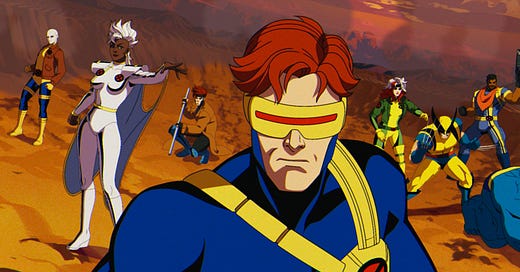




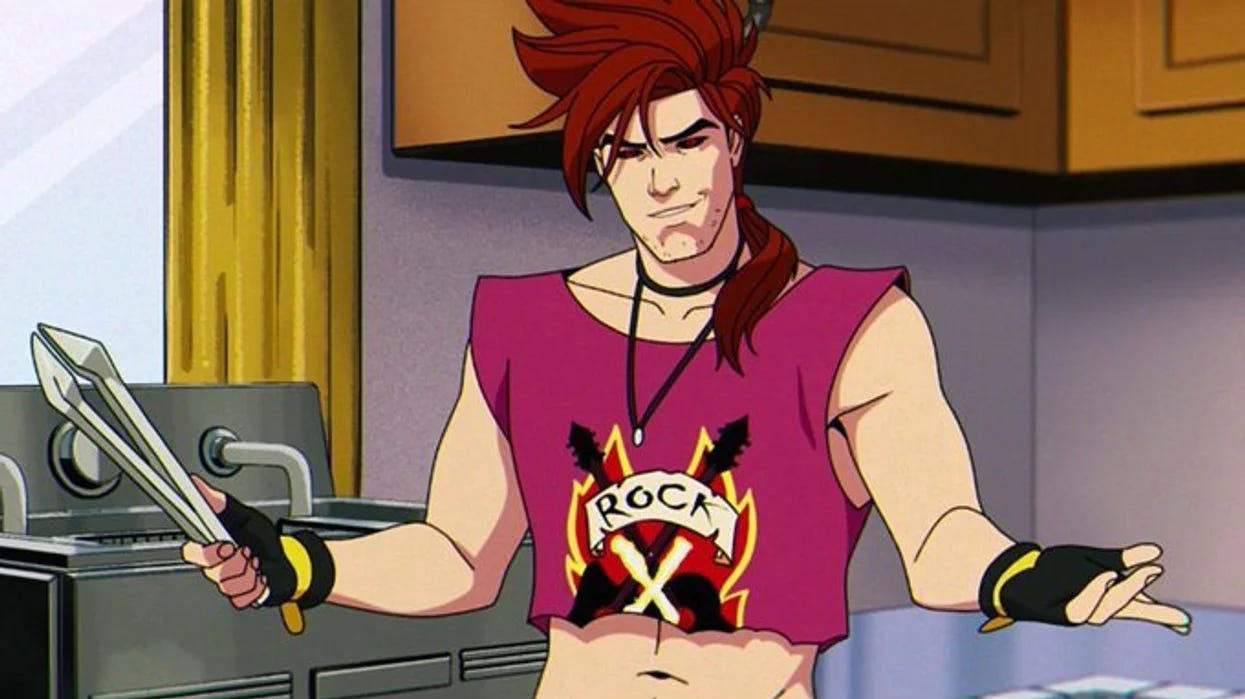

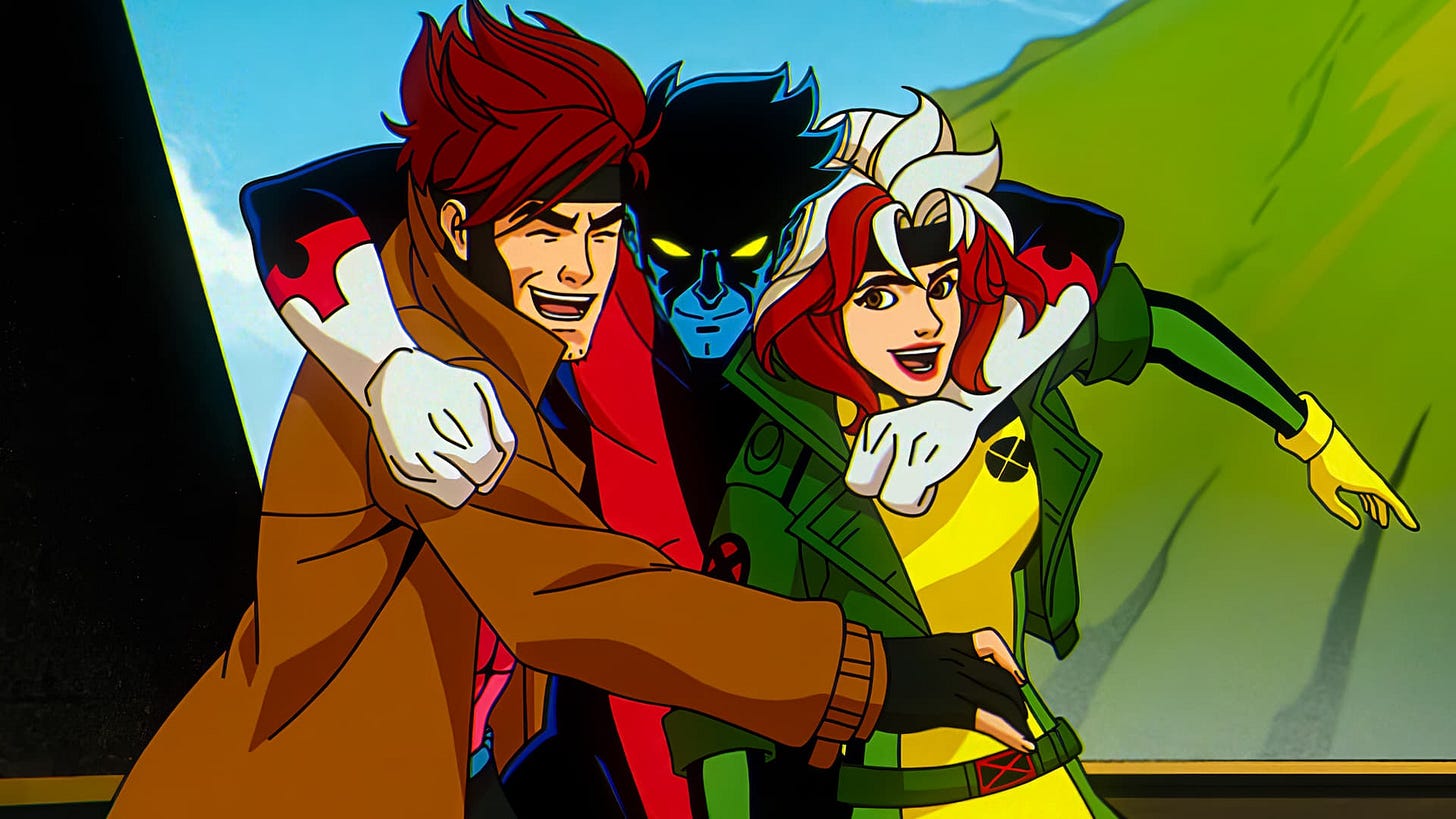
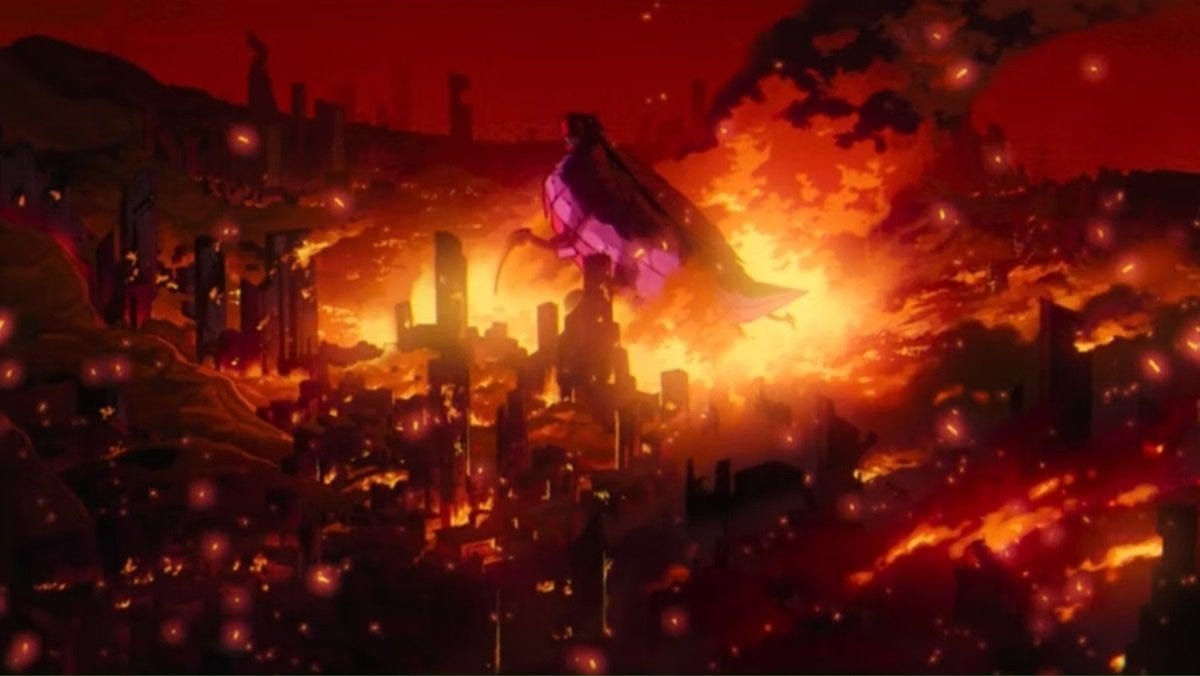
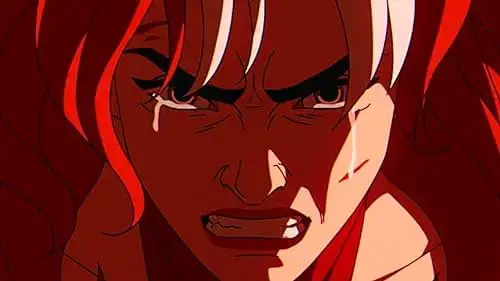
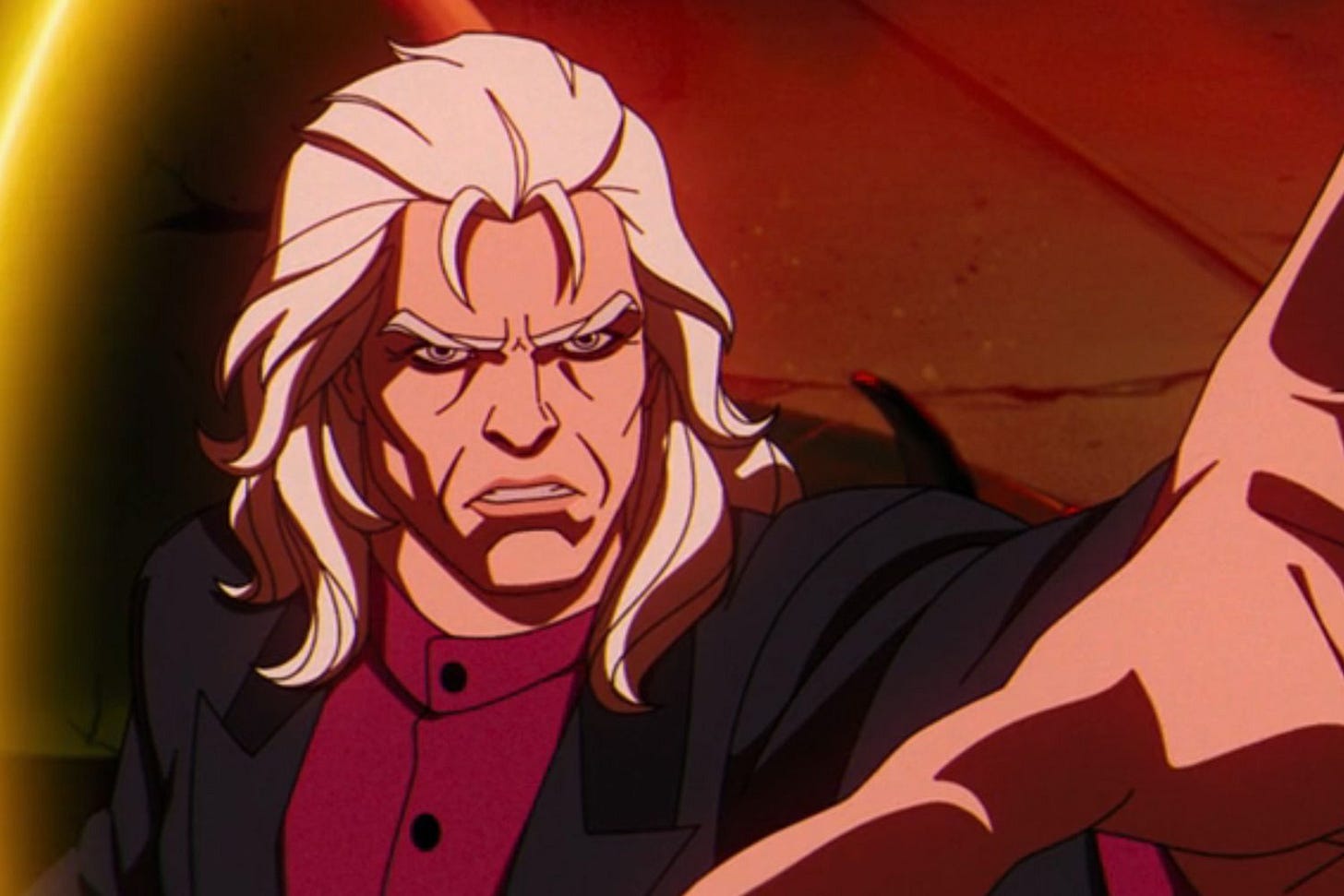
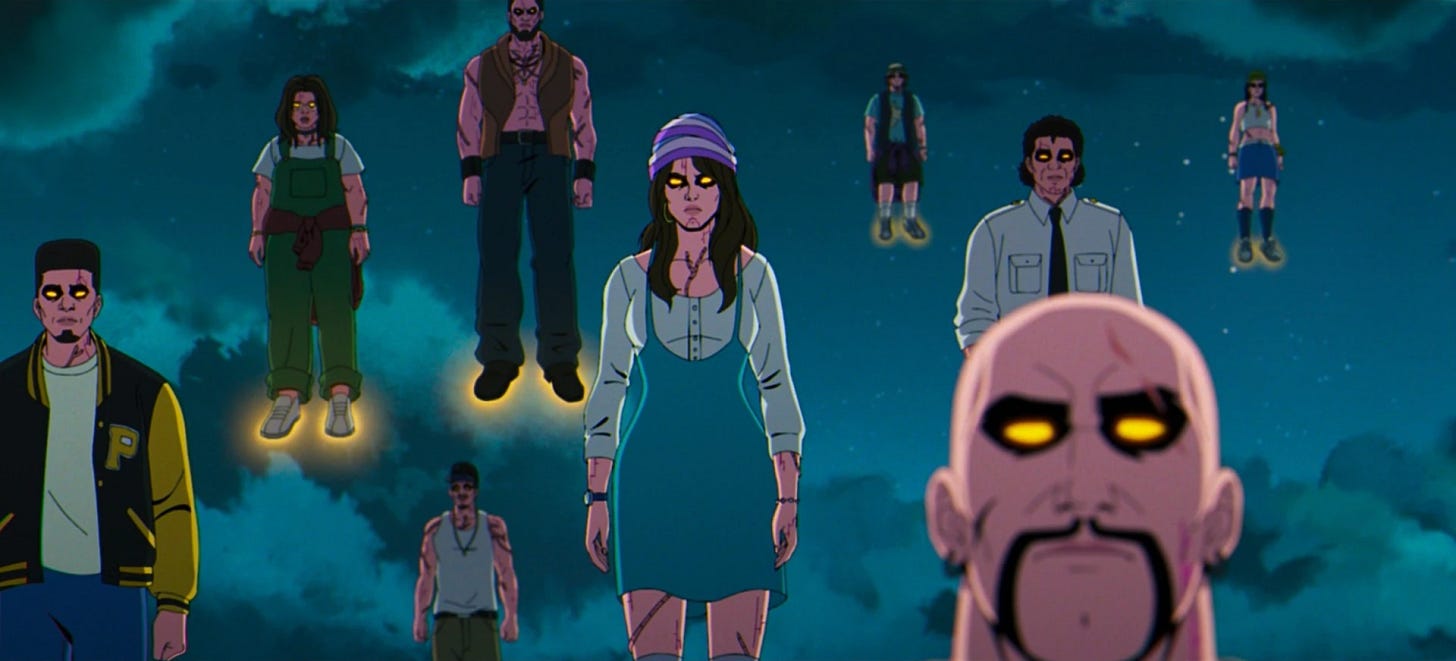
This is such a good piece!! Consider me clamoring for more.
YES. Voice of a generation.